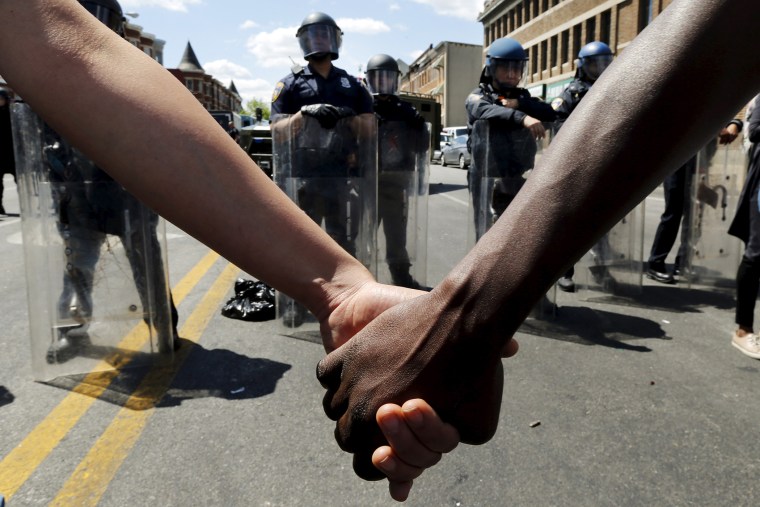ASHEVILLE, N.C. -- America must heal the racial wounds of its past to secure a just future for children of all races, ethnicities and religions.
Events unfolding in Baltimore remind us once again of the long-term damage caused by the legacy of racism. People young and old are expressing frustration with decades of limited employment opportunities and abandoned communities. Either consciously or unconsciously, a destructive criminal justice system is endangering people of color, taking young lives and enraging communities.
But what is the answer?
The nation needs healing.
"The first step is acknowledging the role that racism, sometimes over a period of decades or even centuries, has played in creating today’s environment and shaping the systems around us."'
Since the birth of America, racial bias and structural inequities have influenced public policies and social systems, from employment, health care, education and child welfare to media, food consumption, criminal justice and countless other facets of life. The series of unarmed black men who have died in police custody or in confrontations with law enforcement officers has renewed focus on injustices in African American communities. But racial bias is affecting all communities of color, impacting our children and preventing people from contributing meaningfully to society. We must bring healing to all communities, presenting peaceful pathways to overcoming racism and divisiveness.
There are examples of healing efforts around this nation, where people set aside differences to work together and address inequities. Governments, foundations, non-profits and the private sector are supporting programs and initiatives that are making a difference in communities.
The North Lawndale Employment Network (NLEN) operates a unique transitional jobs program that trains formerly incarcerated men to harvest honey from bees at local apiaries and make all-natural skin care products. The results are extraordinary: the recidivism rate for the honey harvesting program known as “Sweet Beginnings” is below 4%, compared to the national average of 67.8%. Moreover, NLEN’s Building Bridges, Building Connections program is working to increase neighborhood safety by developing strong relationships and building trust among community residents and police officers.
Next week, the W.K. Kellogg Foundation holds its America Healing Conference in Asheville, North Carolina. National and community-level leaders, community-based organizations and civil rights groups will explore ways for diverse communities to engage in authentic efforts to create conditions for supporting, nurturing and expediting community-based racial healing and justice.
This network is reaching hearts, minds and souls to forge multiracial coalitions that will reject racism and discrimination and build racial equity. The first step is acknowledging the role that racism, sometimes over a period of decades or even centuries, has played in creating today’s environment and shaping the systems around us that often exhibit conscious or unconscious bias.
The death of Freddie Gray, an unarmed 25-year-old black man who died from injuries sustained while in police custody in Baltimore, triggered an uprising after his funeral last Monday. But the root cause may be linked to the lack of opportunities for success and the devastation in these communities.
As civic, religious and community leaders urged residents to end the rampage on Monday night, some put the situation in perspective: when riots struck Baltimore in 1968 after the murder of Dr. Martin Luther King Jr., stores, businesses and homes were destroyed. Forty-seven years later, some of those neighborhoods remain scarred; they were never revived or rebuilt. The jobs lost are still gone.
Bryce Covert, the Economic Policy Editor at ThinkProgress, depicted in an article the Baltimore that exists today: the percentage of working black men between the ages of 16 and 64 dropped from 75% in 1970 to 57.5% by 2010. By contrast, more than 75% of white men were employed in 2010. Just over half of all working age, black males have a job in Baltimore.
"These tragedies must do more than raise awareness of problems; in our homes, schools, neighborhoods and places of worship, we must heal the underlying causes of racial fear and divisiveness."'
“Freddie Gray grew up in a neighborhood particularly plagued by the problems that have long faced the city of Baltimore,” Covert wrote, noting that median income there is just $24,000 and that between a quarter to a third of the buildings are vacant, compared to 5% citywide.
Still, a silver lining is emerging from the dust. Peaceful engagement led by young leaders and helped by social media is on the rise. Community voices are driving change, helping to sustain the democracy we all believe in and ultimately create the conditions for all children, families and communities to thrive.
This effort must include ensuring that communities, such as those impoverished areas of Baltimore and places like Detroit, Jackson, New Orleans or Albuquerque, can provide the education, health care, housing and jobs that are a foundation for successful life outcomes. For families and children to thrive, conditions must change dramatically in many communities; but it begins with healing that can facilitate the collaborations to make change possible.
The momentum towards healing must continue. These tragedies must do more than raise awareness of problems; in our homes, schools, neighborhoods and places of worship, we must heal the underlying causes of racial fear and divisiveness.
Strengthening our nation requires a decisive commitment to healing, to eliminating racism and ultimately ensuring our children can be meaningful contributors to society.
La June Montgomery Tabron is president and CEO of the W.K. Kellogg Foundation, a private philanthropic foundation.
